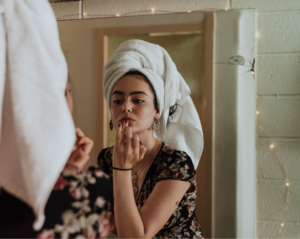Have you ever wondered what your skin type is? If the answer is yes, then it’s your lucky day because today we are giving you all the insight into all things skin type! Read below to find out which category you fall under along with some tips and tricks on how to elevate your skin care routine.
Normal
People with a normal skin type tend to not experience many breakouts. Their skin doesn’t tend to react to new products or weather changes negatively and they don’t need to constantly moisturize or blot oil from their face throughout the day. The skin is firm, with minimal fine lines and wrinkles
Pro Tips: Since normal skin doesn’t experience much sensitivity, dryness, or oiliness, you have the liberty of trying any products of your choosing until you find which ones work the best for you. A fun new product to try is the Obagi Professional-C Microdermabrasion Polish + Mask. After just one use, people saw the masked reduced signs of aging, such as dull complexion, fine lines, and wrinkles and it also smells amazing!
Oily
People with oily skin always seem to be glowing and they are no strangers to blotting sheets or mattifying powders. They also might find that makeup and skin care products don’t always lay as you want them to and they tend to have fewer fine lines and wrinkles.
Pro Tips: First things first, shine control is your new best friend! Having oily skin does have it’s benefits but, you should avoid using ingredients like mineral oil, petroleum, and alcohol. Products labeled “non-comedogenic” work great for this skin type as they won’t clog up your pores and produce any more excess oil. Be sure to use oil-free moisturizers, chemical exfoliants, and clay masks, and not to over-wash your face as drying out your pores can use them to produce more oil to compensate. A good toner to try is the Obagi-C Rx C-Balancing Toner, as it keeps the complexion bright as well as regulating oil production.
Dry/Dehydrated
Dryness and Dehydrated skin are actually two different skin types but, they have very many similar symptoms and concerns.
- Dryness is caused by a lack of oil in the skin, which in turn causes the skin to be flaky, sensitive, itchy, and crack. It may be caused by lifestyle choices and environmental factors or a chronic condition that may be hereditary or health induced.
- Dehydration is the result of your skin not retaining enough moisture. Your skin may feel tight, have a papery appearance, or show small, fine lines when your skin is pinched together.
Pro Tips: If you have dry skin, you’ll want to seal in moisture by applying a rich moisturizer several times each day, especially after washing your hands or bathing. Try to keep the air in your home humid and warm to help with the healing process and avoid using harsh soaps or products containing citrus oils or lots of fragrance.
If your skin is hydrated, make sure to use water-based products as oil-based can actually make your skin condition worse. Be sure that you’re drinking a lot of water each day, as that will be a game-changer!
A good product to try for both skin conditions is the SkinCeuticals HA 5 Gel, as it will give the skin a boost of intense hydration with any moisturizer of your choosing.
Combination

Are none of these really fitting your skin type? Then you probably have combination skin. Combination skin can be dry or normal in certain areas, or in most of your face, and oily in others like your T-zone (the strip across the forehead and the line down the nose).
Pro Tips: Just like oily and dry skin types you’ll want to stay away from the same ingredients such as alcohol-based products. Isolate your problem areas with spot treatments and use toners or balancing creams to even out the skin. To help even out skin tone, try the Obagi Nu-Derm Toner, as it works to restore the natural pH balance of your skin.
Acne-Prone
If you get frequent stubborn breakouts, you probably have acne-prone skin. This means that your pores tend to clog easily, making you more susceptible to whiteheads, blackheads, or pustules than other skin types. You can have oily or dry skin and be prone to acne.
Pro Tips: Use cleaners specifically formulated to treat acne. Using exfoliants and moisturizers will also help to minimize breakouts and be sure while washing your face to cleanse gently to avoid trauma to existing breakouts. Look for products that contain acne-fighting ingredients such as salicylic acid, clay, benzoyl peroxide, or retinol. A good product to work into your routine is the Obagi Tretinoin Cream, which comes in 3 different strengths depending on the intensity of the acne you’re treating.
Sensitive
If you have sensitive skin, it’s most likely due to genetics, allergies, or environmental factors. Some signs of sensitive skin include:
- Skin that flushes easily
- Frequent rashes and bumps
- Stinging or burning after using a skin care product
- Negative reaction to fragrance
Pro Tips: Avoid using fragrances and irritants like alcohol or antibacterial ingredients. Look for products with fewer additives, and seek out those with calming, healing, or anti-inflammatory properties. A good product to try is the SkinMedica Sensitive Skin Cleanser, which also provides a boost of extra hydration.
Mature
If you have mature skin, you may notice sagging, dark spots, dullness, and dehydration. Everyone’s skin doesn’t age at the same pace but, the signs of having mature skin are fairly universal.
Pro Tips: Create an anti-aging routine with restorative treatments, which can boost collagen, and protect against environmental aggressors and cell turnover.
A good product to work into your routine is the SkinMedica TNS Advanced Plus serum, as it has a growth factor proven to address sagging skin.



